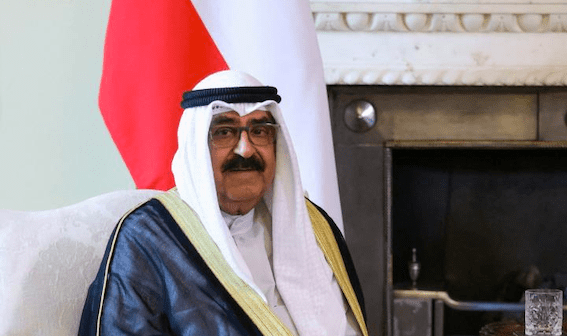|
إستماع
Getting your Trinity Audio player ready...
|
The death of eighty-six-year-old Emir Nawaf al-Ahmad al-Sabah was not unexpected. He had been hospitalized for undisclosed reasons in November, and his increasingly poor health had already caused him to give Crown Prince Mishal al-Ahmad al-Sabah de facto control in 2021. But Sheikh Mishal, a half-brother, is already himself eighty-three, which will prompt much speculation about who the wider al-Sabah clan favors as heir apparent to Mishal and whether a much younger person—more capable of a longer reign—will be chosen. In the Kuwaiti system, the new emir, who has not yet taken the oath before parliament, has twelve months to choose an heir. No names of likely candidates have yet emerged in public.
For the moment, Kuwait is engaged in protocol. Emir Nawaf’s death was announced on December 16. He was buried after a funeral service attended by family members and the speaker of Kuwait’s parliament on December 17. Regional and world leaders are now making condolence visits. The first to arrive was Emir Tamim bin Hamad al-Thani of Qatar, followed by King Abdullah of Jordan and King Hamad bin Isa al-Khalifa of Bahrain. Iranian foreign minister Hossein Amir-Abdollahian, Palestinian leader Mahmoud Abbas, and Iraqi prime minister Mohammed Shia al-Sudani were next. Crown Prince Muhammad bin Salman, known informally as MbS, represented Saudi Arabia, which suggests that his father, King Salman, who at eighty-eighty next year is the oldest Gulf leader, was not well enough to travel.
The memory of Iraqi leader Saddam Hussein’s invasion in 1990 and the subsequent liberation by U.S.-led forces evokes Kuwait’s vulnerable position at the northern end of the Persian Gulf, sandwiched between Iraq and Saudi Arabia, with Iran just a few miles across the water. OPEC member Kuwait has nearly 10 percent of the world’s oil, and with a population just exceeding 4 million—70 percent of them expatriates—its name has become synonymous with wealth.
Yet despite this, the country has been plagued by divisive governance and maladministration. The fifty members of the National Assembly frequently criticize the current government, led by Prime Minister Sheikh Ahmad Nawaf, the eldest son of the deceased emir. As a consequence of the tough grilling ministers face in the chamber, Sheikh Ahmad, appointed in July 2022, is already on his fourth cabinet. The latest edition of the Middle East Economic Survey (MEES) energy newsletter described his relations with parliament as “tumultuous” and reported: “Amid such an acrimonious relationship, much needed fiscal and economic reforms continue to go unaddressed.” A glaring example is the emerging need to lease ship-based electricity-generating plants because the existing onshore infrastructure is barely adequate to provide power for the summer months, when air-conditioning demand peaks.
Kuwait’s leadership looks to the United States for military support and hosts more than 13,000 American personnel in the country. Washington must be wishing Sheikh Mishal well in his leadership role and hoping he can choose a capable and probably younger al-Sabah to eventually succeed him.

